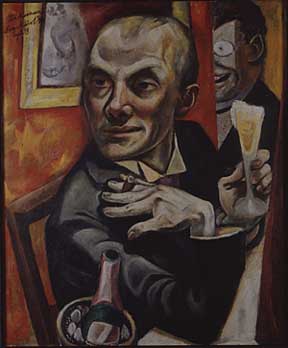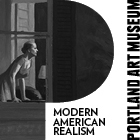
|
||
|
Portland art blog + news + exhibition reviews + galleries + contemporary northwest art
|
||
Weimar Litmus Test & Figurative Art 
Self-Portrait with Champagne Glass, 1919 Max Beckmann (German, 1884-1950) Oil on canvas; 25 9/16 x 21 7/8 in. (65 x 55.5 cm) Private collection, courtesy W. Wittrock, Berlin In the NYT's Roberta Smith had a timely review of the "Glitter and Doom" show at the Metropolitan Museum. The focus on the anxiety present in the New Objectivity movement's artists like Otto Dix and Max Beckmann is absolutely in step with the mood of today. Still, one would have to stifle a chuckle in order to compare the anxieties found in Cecily Brown and Dana Schutz to that of Dix and Beckmann (and I like Brown and Schutz). The difference, Weimar Germany had just come off of WWI and the US's war in Iraq doesn't have the same urgency, though we are in a time of decadence and wealth while a smaller scale war of attrition rages. Good that the Metropolitan put this on, with the Miami Art fairs coming up this seems like a kind of cultural litmus test. Where is our version of brutal honesty? It definitely isn't Pierre Huyghe, who has a purosefully theatrical slight of hand that's been big ever since Matthew Barney. Sure Beckmann is theatrical too, but it is infinitely more honest than nearly everything Ive seen lately. Today good intentions and entertainment seem to be a substitute for difficult critiques and self-reflexive questioning? On to someone who could use a huge dose of Otto Dix's depth, Portlander Ty Ennis (who was reviewed on PORT a few weeks ago) has spawned a hilarious unauthorized biography and a flux 7 out on the PDX blogosphere. Catch the show tomorrow on its last day to gauge the fuss (correction Dec 10th is the last day). Ennis is a talented artist in search of stronger subject matter, though according to the flux 7 he stands by it. Good on him, let's see if he gets something from the response he's received for this show, the criticism has been valid. Posted by Jeff Jahn on November 24, 2006 at 17:16 | Comments (18) Comments The depth of Ty's work can only be understood when you grasp that his current show at NAAU is one conceptual posit. Posted by: rlm I don't think that anyone at PORT is particularly "desperate" to have the last word on anything. If that were true, PORT wouldn't accept comments. I appreciate it when others point out alternative perspectives, be they positive or negative, dry dismissals or full-on impassioned rhapsodic rebuttals, on anything that I review. The lack of only one "correct" interpretation is exactly what makes art such a source of continual fascination, and I would never seek to "prevail" over an artist's work. Quite the opposite. I would like to help artists prevail by pointing out ways that their work succeeds or fails in the eyes of one viewer (and hopefully more via comments). Engaging communication is the implicit goal of any professional artist, and an artist can always internalize or disregard criticism as he/she sees fit. Most people who have reached the level of prominence that Ty has attained are where they are partly because they can make use of criticism, or at the very least take it in stride, and his comments on flux suggest that he understands that in art (if not in say, racist stand-up comedy breakdowns) the old maxim that all publicity is good publicity generally holds true. I'd be genuinely interested in reading an expansion on what you think has been overlooked in critical discussion of The Bronze Loss...or what exactly makes dick jokes so "hysterical". I do however disagree with esteemed colleague in his opinion that Ty Ennis would do well to achieve the depth of Otto Dix, as said depth seems to have been attained after being seriously wounded multiple times during WWI and suffering from recurring nightmares of crawling through destroyed buildings. Posted by: Jessica Bromer The very least that valid criticism should do is inform opinion and cultivate taste. Posted by: rlm I thought proving God right or wrong was the goal of artists. Engaging communication? Hardly. Who talks in front of the Hoover Dam, Jeff Koon's Puppy, Richard Serra's Torqued Ellipses, video of the World Trade Center collapsing, or Damien Hirst's shark? Artists are interested in communication with their peers, their mentors, and with art history. Everything else is publicity. Posted by: jerseyjoe Oh, poor word choice (please note the time of post and forgive). I meant engaging as an adjective like compelling or fascinating and communication as in affecting, reaching the viewer mentally and emotionally. All your examples would induce awe in a lot of people which is within the purview of my intended definition of engaging communication. I do think most artists aren't so wrapped up in their own personal worlds that the only people they are interested in communicating with (verbally or non-verbally) are peers, mentors and "art history" while viewing their larger audience, including critics, with the same disinterested neediness as, say, carnival workers. There's a fair amount to talk about with all of your examples, perhaps not while beholding them but about the ideas and events surrounding them. Dams often have pretty interesting histories--displacing or helping farmers, glorifying presidents, fueling power plants, etc.. How does that puppy affect the daily lives of the population of Bilbao...(Here's a fun tidbit from wikipedia: Before the dedication at the museum, a trio disguised as gardeners attempted to plant explosive-filled flowerpots near the sculpture, but were foiled by Bilbao police.) in comparison to the Serra Tilted Arc controversy? To whom are curators of public art responsible and in what ways? And Damien's great groundbreaking shark falling apart in time with his degeneration into a publicity seeking huckster. Interesting stuff. What gets said in front of the video of the WTC collapsing? David Foster Wallace wrote a really good essay about that very topic--"The View from Mrs. Thompson's" from Consider the Lobster. Posted by: Jessica Bromer Everybody play nice and the rule here is, "no personal attacks." As for the responses above, Jessica wrote a nice, solid review and its telling that PORT was the only media organization that reviewed the show, and though highly anticipated it a was a critical dud, for reasons that Jessica outlined quite well. Also, a show that is just simply bad generally won't receive a review, there has to be something there to make it worthy of a bad review. These reviews do promote discussion and taste, as evidenced by all the response (both thoughtful and reactionary) it has generated. The reviews also energize the viewers and I felt that the show needed a last little bit of controversy and discussion before it came down today. Go see it. To those ends Jessica's was a highly critical but fair review; it doesn't even come close to vicious. Also, I must point out that at no point did I directly compare Beckmann to Ennis, instead I was making a purposefully tangential point that nobody would accuse Dix or Beckmann of the youthful affectations that Ennis has been rightly or wrongly accused of. There is something of interest there... let's just say the experience shows and I'm certain Ennis will find his own way. As for "The depth of Ty's work can only be understood when you grasp that his current show at NAAU is one conceptual posit." I think most people saw it as one conceptual posit and many, including myself, saw that "posit" as a belabored series of affectations that belied the artist's age and undermined the show. I didn't see it as autobiographical at all, just telling. As for publicity, humans are social animals and "intellgent publicity" could also be defined as discourse, which is the preferrred tone I'd like to see here.... though it is nice to see some all worked up about the show. It's much better than apathy. Lastly, rlm, you will notice my post is a news post and not a review (so criticizing it for not being a proper review is at best a waste of time and moot). Jessica wrote the review and I was calling attention to it. You might not like it but it was a highly contextualized and fair critique and that is what we pay her for. Also, my "dose of Dix" comment is the sort of thing any serious artist can handle and I'm certain Ennis wouldn't find it all that damaging, in fact I think it's helpful. Otto Dix is one of the great master satirists and since Ennis is an existential satirist as well it seemed like a fine free association with two related artists. In the end I don't think Ennis needs anyone on a white horse riding to his rescue, the fact that he has created such grist with an accomplished yet somewhat wanting show is a kind of achievement, "a bronze loss" as it were. Oh and one more tangent I'd like to pull in... I think this once again disproves that often made but seldom supported assertion that it's tough to have an argument in Portland. It all depends on whether you are talking about inter-clique consensus or the various schizms that are everywhere in the city. On PORT you see a whole range. Posted by: Double J I know lots of artists and most are grateful that an audience beyond their peers, mentors, and dead artists exists. But, like everyone else in performing fields, they understand that the people sitting in the front row, putting money in the peep machine, and buying artwork are doing so because they can't do that "thing". And how they contribute to the arts is by filling the venue and buying a t-shirt. Spectators relate to spectators and artists relate to each other. Is the back story really more interesting than the sensation of looking at the examples I gave? It's easy to write about everything but that sensation. Rarely will a writer do anything more than attempt to contextualize the "thing", give inane biographical information that is supposed to give insight into where this "thing" came from (Carl Andre worked in a railyard, Richard Serra's father worked on ships, Ty Ennis drinks at Yur's), tell a personal story about why they relate or don't relate to the work, or go blah blah about technique and materials. Artists count how many times their name is mentioned, check to see if the writer name-drops dead artists, their rivals, and their peers. how many actual works are described, look for the word "genius", and clip the article to add to their press kit and to send to their parents. Artists relate to publicity. It helps fill the venue and sell more t-shirts. Posted by: jerseyjoe Joe, my favorite phrase is Res Ipsa Loquitur (the thing stands for itself) so I'm basically in agreement with you... except that all things that stand for themselves also create a wake, shockwaves, a sea of calm etc. I see criticism as a way to explore the effects that works of art might inspire. An inspired, possibly deeply felt reaction is about the best any artist or writer can hope for. Both Ennis and Jessica clearly touched some nerves and I believe it was because there is quality present in both the review and the show itself. Ennis has improved since hist first show but with all of the hooplah the expectations rose considerably higher and Jessica did a fine job of stating where the work didn't delver completely. Posted by: Double J We at the NAAU appreciate all the concerned attention that you are giving Mr. Ennis. There are two points that we would like to clarify. 1. The show closes on December 10th (not today) xo Posted by: NAAU The prospect of reading about the "craft" of making art is entirely tedious but biography is interesting and does have context.....case in point....Rebecca's note concerning Dix and "shell shock". Posted by: rlm I disagree. Dix's work was barely interesting to me before somebody spilt the beans about his wartime trauma. Now, I feel like I am being pressured into buying into his editorial cartoons because he was really there and his trauma is real and I must be blind if I don't see it. If Dix intended for the viewer to consider this along with the work, he would have included it in the work. A point that I was trying to make before, is that when the yakety yak and blahdy blah is gone, the objects and images will remain to be judged on their merits alone. It seems pretty clear that art writing is nothing more than publicity when one considers that it is posted on the web and printed on paper in daily, weekly, or monthly journals rather than carved into stone. Posted by: jerseyjoe In response to jersey joe's second comment.... As far as your last paragraph goes, yeah, that is pretty much what I've observed too. Unlike film, literature and music criticism, art criticism is not a broadly used consumer aide, so there's no purely practical reason why most people would be motivated to do more than skim it, which is probably why art criticism is often so....weird. I like the group discussion possibilities of PORT because I do really question the journalistic pedagoguish model of art criticism, whereas I always found art school group crit--the friction of the various perspectives of a passionate. sympathetic, competitive group of audience members--enlightening in a variety of ways. I do think that your neat separation between "artist" people and "spectator" people is simplistic and condescending to the art audience. For one thing, of course spectators relate to artists as well as to other spectators. That's why they're choosing to pay attention to those particular artists in the first place. Or did you mean in person? Plenty of artists do genuinely prioritize a strong immediate dialogue with their audience (Marina Abramovic comes to mind, Red 76, a lot of musicians like it when people dance during live performances, in part because they like to see people expressing themselves in a sort of kinetic conversation with them) Also, a good many members of the spectator class have some sort of artistic impulse and output. A curious, sensitive engineer might relate to Sol LeWitt's work or da Vinci's sketchbooks more deeply than a randomly selected painter would. And being an artist, even a good artist, by no means guarantees that you'll understand or appreciate another artist's work more than the laity, especially the work of "rivals"... I would also say it's a pretty broad assumption that people purchase or choose to experience art "because they can't" do it themselves. Some people would rather practice medicine and listen to symphonies than compose symphonies even if blessed with the innate musical talent, that, if developed, could have led to a successful music career. Sometimes its a question of priority and passion, not capacity. "Is the back story really more interesting than the sensation of looking at the examples I gave? " I think they're both interesting in different ways. Apples and oranges. The literary analogue of sensual non-narrative visual art is poetry. I don't think journalism/criticism can or should try to reproduce the sensations that art produces in the viewer. You've basically dismissed every other way that criticism could be useful, and yet, if critical discourse surrounding art is so unimportant, why are you participating here? Yes, art criticism is less interesting and important than art. That doesn't mean it has no validity at all. The primary job of art criticism is, as you said, publicizing art, getting people to go experience these indescribable sensations for themselves or "buy the t-shirt," as you'd have it. Biographical or contextual information can sometimes be a way to establish a reason for the reader to care about the artist enough to read on or go to a show. It's a tool that writers can use to pique the reader's interest and I don't think it's always inane. Sometimes it legitimately adds to an understanding the work. For example, knowing that Andy Warhol was a sickly child who loved movie star magazines helps one grasp the emotional depth of his connection to the shallow world of glamour and fame. And knowing that his brother fed him a can of soup for lunch everyday while his beloved mother was sick in the hospital is interesting to consider even though it may actually mean nothing. I think that connecting the artistic production of a person to that person's life story can be a valuable way to fill this publicity space. Posted by: Jessica Bromer Well joe, with the ease of storing and transferring data I feel pretty good about the prospects of reviews outliving the work that inspired them. Also, thanks for chiming in Ruth Ann, I made the correction... it will be interesting to see what Daniel writes... its definitely his kind of work. The show deserves some more attention and though most of the people that Ive talked to about it are kinda let down (I think they sense there is more to come from him and are impatient) I think it has more to do with a huge backlash against the glut of works on paper that are overtly self-conscious (its become a highly parodied national trend that was big here 6 years ago, went away, came back etc). I brought up Beckmann because he's self-conscious in a way that nobody would ever accuse of being trite which is the general and often valid condemnation of this kind of work. I dont think its all bad, I do like Joe Biel and Storm Tharp has a kind maniacal quality that pushes the envelope. I guess I prefer obsession to affectation and for people like Warhol it became impossible to distinguish between the two, jackpot.
Posted by: Double J I'm not passing a judgement on the spectator, only pointing out the differences. I go to movies not only because I can't make my own, but also because I'm not driven to do so. Ask any filmmaker what audience really matters to them and they'll tell you the same that I said that artists would. Every thinking person knows that people will buy anything if given the right pitch. The artist looks elsewhere for affirmation. Dancing is hardly a dialogue. Red 76 has nothing without a dialogue and even then, they have nothing. Marina Abramovic? Are you kidding? Her work has no more to do with spectator participation than Mick Jagger's does. She aims for a personal ecstatic moment and what does the spectator do? Applaud. If the artist/performer was REALLY interested in the artistic impulses of the audience, they'd stop whatever they were doing and facilitate a show and tell. I don't care if Warhol really liked soup or was legitimately starstruck. What matters with Warhol and other great artists' work is what the rest of us think and feel about the images that are being presented. Not what we think of him, but what we think of Marilyn, Marilyn, Marilyn. Posted by: jerseyjoe "The experience I learned was that, if you leave the decision to the public, you can be killed...I felt really violated: they cut my clothes, stuck rose thorns in my stomach, one person aimed the gun at my head, and another took it away. It created an aggressive atmosphere. After exactly 6 hours, as planned, I stood up and started walking toward the public. Everyone ran away, escaping an actual confrontation." ---Marina Abramovic, describing a 1974 performance. She at least tried. Posted by: Jessica Bromer ...which lead me to think about all of this and I must point out that Andy Warhol is probably one of only a few people who could be considered just as famous as Marilyn or even moreso. This was a goal of his and he achieved it. Generally humans mostly care about other humans... a very small group of people care about art and even then the artists themselves "matter" a whole lot. In the case of Otto Dix, his experience does matter and if that feels like pressure or some kind of hook, get used to it... art often complicates context and most good art has context that is worthy of exploring. If you choose not to do so, fine... but the history remains. Personally, I come at art from a humanistic angle and hope that art objects, through thier stubborn presence can accumulate all sorts of pesky consequences.... like philosphical snowballs rolling down a hill, they gather more material with time. Still the core or origin persists under all those layers. Posted by: Double J What you failed to mention is that Abramovic invited them to do whatever they felt like and even provided the loaded gun. It's hardly surprising that somebody would point it at her, and it's also not surprising that another person would take it away. Everyone who was present would have a different story to tell about how the piece unfolded, but we're not really interested, as they are just spectators, right? Posted by: jerseyjoe Well, I wasn't trying to hide the fact that she set the whole situation up...I guess I erroneously assumed that was implied by her recollection. My point was that she was initiating a relationship with her audience--not a perfectly equal dialogue with a colleague...she had Ulay for that, and only Ulay would do--but she was seeking a heightened awareness of her audience and encouraging participation, i.e I was not kidding. I actually am interested in the observations of people who aren't the center of attention, if they're skilled at verbal self-expression and good story-tellers. I can't speak for "we" but I like to hear insightful observations from all corners. Posted by: Jessica Bromer Post a comment Thanks for signing in, . Now you can comment. (sign out)
(If you haven't left a comment here before, you may need to be approved by
the site owner before your comment will appear. Until then, it won't appear
on the entry. Thanks for waiting.)
|
| s p o n s o r s |
 |
 |
 |
 |
 |
 |
 |
 |
 |
 |
 |
 |
 |
 |
 |
 |

|
Site Design: Jennifer Armbrust | • | Site Development: Philippe Blanc & Katherine Bovee | |


![[TypeKey Profile Page]](http://www.portlandart.net/nav-commenters.gif)